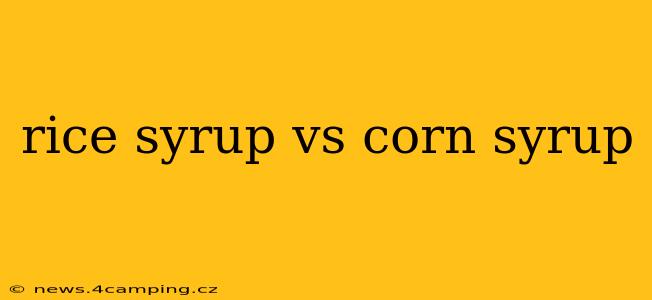Choosing between rice syrup and corn syrup can feel overwhelming, especially with the plethora of sweeteners available today. Both offer sweetness, but their origins, nutritional profiles, and potential health impacts differ significantly. This in-depth comparison will help you make an informed decision based on your dietary needs and preferences.
What is Rice Syrup?
Rice syrup is a sweetener produced by the enzymatic hydrolysis of rice starch. Essentially, enzymes break down the starch into simpler sugars, primarily glucose and maltose. This process results in a thick, syrupy liquid with a mild, slightly less intense sweetness compared to corn syrup. It's often considered a more "natural" alternative, especially by those avoiding corn-based products. However, it's important to note that the processing still involves industrial methods.
What is Corn Syrup?
Corn syrup, on the other hand, is derived from corn starch. Like rice syrup, enzymes break down the starch into sugars, but the resulting syrup contains a higher proportion of glucose. Corn syrup is widely used in processed foods due to its cost-effectiveness and ability to enhance texture and shelf life. High fructose corn syrup (HFCS) is a specific type of corn syrup where some of the glucose is converted to fructose, resulting in a sweeter syrup.
Rice Syrup vs. Corn Syrup: A Nutritional Comparison
| Feature | Rice Syrup | Corn Syrup |
|---|---|---|
| Source | Rice starch | Corn starch |
| Sweetness | Mildly sweet | Sweeter |
| Glycemic Index | Moderate (varies depending on type) | High |
| Fructose Content | Low | Varies (higher in HFCS) |
| Fiber | Trace amounts, often negligible | Negligible |
| Vitamins & Minerals | Very few, often negligible | Very few, often negligible |
Note: The glycemic index (GI) can vary depending on the specific type of rice syrup and processing methods. Some types may have a slightly higher GI than others.
Is Rice Syrup Healthier Than Corn Syrup?
While rice syrup is often marketed as a healthier alternative, the difference isn't always dramatic. Both are primarily composed of simple sugars, contributing to blood sugar spikes if consumed in excess. The lower fructose content in rice syrup might be considered slightly beneficial for some individuals, as high fructose consumption has been linked to various health concerns. However, neither offers significant nutritional value beyond sweetness. Moderation is key with both sweeteners.
What are the Different Types of Rice Syrup?
Several types of rice syrup exist, each with slight variations in flavor and texture. These include brown rice syrup, white rice syrup, and short-grain rice syrup. The differences primarily stem from the type of rice used and the processing methods. Brown rice syrup often retains more nutrients due to the use of unrefined rice.
Which Syrup is Better for Baking?
Both rice syrup and corn syrup can be used in baking, but their properties differ. Corn syrup's higher glucose content contributes to a moister and chewier texture, while rice syrup may result in a slightly less sweet and less sticky product. The choice often depends on the specific recipe and desired outcome.
What are Some Alternatives to Rice and Corn Syrup?
If you're looking for healthier alternatives, consider options like honey, maple syrup, agave nectar, or date syrup. These natural sweeteners often contain small amounts of vitamins, minerals, and antioxidants, but they should still be consumed in moderation.
Conclusion: Making the Right Choice
Ultimately, the "better" choice between rice syrup and corn syrup depends on individual needs and priorities. While rice syrup might be a slightly more appealing option for those seeking to reduce their fructose intake and prefer a less intensely sweet flavor, neither is a significant nutritional powerhouse. Prioritizing whole foods and limiting added sugars in general remains the most effective approach for overall health.
